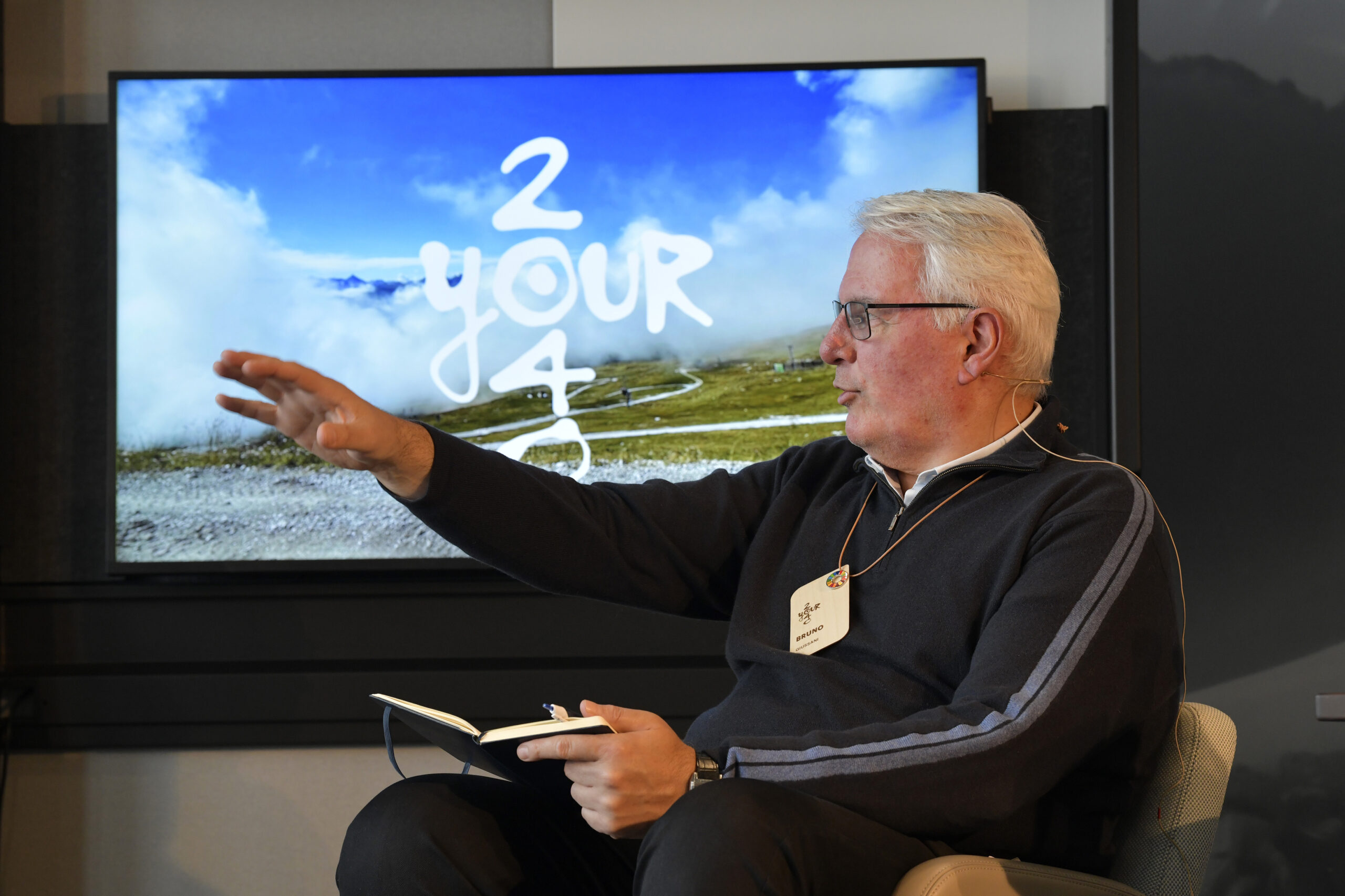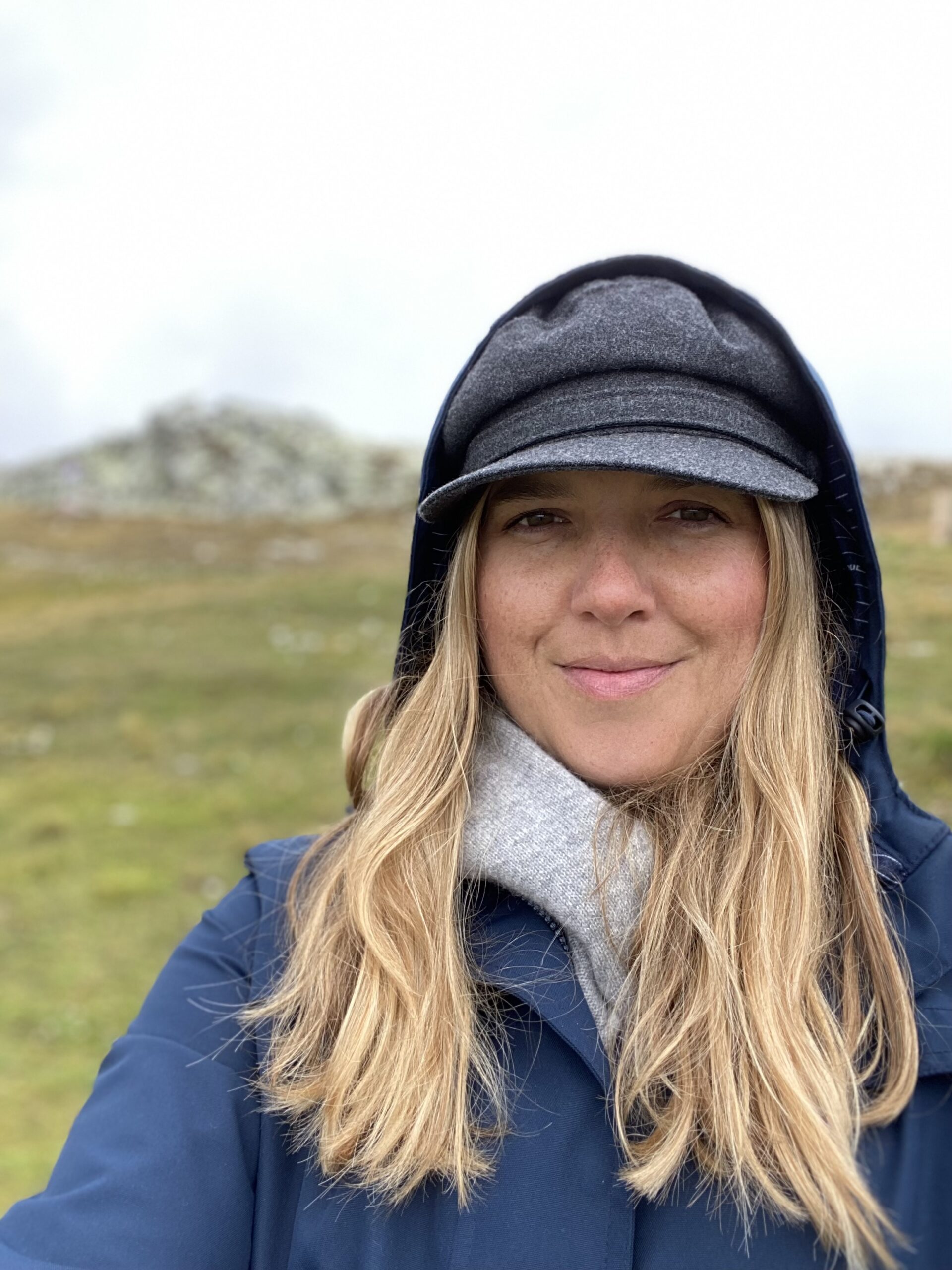Laax. A beautiful mountain resort situated in the Swiss Canton of Graubünden. Best known as a freeride snowboarder's paradise, the village was host in September 2021 to the first ever gathering of the [y]our 2040 community, a coalition of the willing focused on "the world we want to co-create." Supported by ETH Zurich, the event included participants from diverse backgrounds, all connected by a common goal and shared values. Taking the opportunity of being onsite to talk to some of them, we want to make the link with our RETHINKING LIVING campaign, a virtual red-thread we have been running since the start of the pandemic.
From Laax to Davos: Reflections on RETHINKING LIVING, Ep. 6
Episode 6: Bruno Giussani, Global Curator, TED
by Viktoria Ivarsson
The Journey Begins
RETHINKING LIVING invites us to consider the grand challenges and global issues of today through the lens of the latest science and knowledge. What is life? How do we live? What are the consequences of our lifestyle choices? We asked participants in Laax to tell us what are the questions that keep them up at night, and how they see the future evolving. This video series distills their reflections, to help us think about what could, and what should come next. ETH Zurich will take up these questions in its RETHINKING LIVING Pavilion, a space designed to promote dialogue and exchange with a broad audience during the World Economic Forum's Annual Meeting 2022 in Davos. Since filming, the meeting has been moved from January to May due to the pandemic.
Starting Now, Without Waiting

Photo credit: Your2040 / Andreas Eggenberger
In our sixth episode, we hear from Bruno Giussani who is Global Curator at TED. It was very timely that the gathering in Laax happened just before the launch of the TED Countdown Summit, ahead of COP26. "The one thing that keeps me up at night is how can we connect all the different energies in different groups, scientists, activists, politicians, investors, indigenous leaders, people from the North, from the South, any gender, any any generation? How can we connect those energies towards a positive solution towards getting to a stable, sustainable future all together?" See his clip above or read the edited transcript below.
For additional resources and further information, visit:
https://your2040.com
https://ethz.ch/en/the-eth-zurich/global/events/rethinking-living.htm
https://www.giussani.com
https://countdown.ted.com
For additional resources and further information, visit:
https://your2040.com
https://ethz.ch/en/the-eth-zurich/global/events/rethinking-living.htm
https://www.giussani.com
https://countdown.ted.com
My name is Bruno Giussani. I am the Lead Curator of the Countdown Project at the TED Conferences. It's our climate initiative. We just started about a year and a half ago and it is focusing on climate solutions at scale. We do that by bringing scientists and designers and activists and investors and the producers to the TED stage into the TED format and disseminating their ideas and creating initiatives and alliances and cooperation around those ideas.
Now we are at this moment where we are starting to get all the tools that are available here. Clean energy is cheaper than coal, oil. Today, wind and solar are the cheapest and in some places in the world, that is the cheapest form of electricity generation. We have a range of other technologies, from electric cars to batteries, etc., that come into play. We have more powerful computers which allow us at the same time to model things, but also to develop new things like new materials, for example. There is a purposeful redirection of finance that is starting to gather speed and gather momentum and become big scale towards clean investments in many, many different ways that are better if people engage in this, not better in the sense of who they are as persons, but more competent for doing this.
20 years ago, most of the people who started companies that had to do with sustainability were activists, and now they're entrepreneurs. They know how to build a company and to scale it and so on. So we had a very interesting moment to try to imagine 20 years ahead, and what we can really do and how we can go there. The thing is that now, for the first time, there is a realistic pathway to get to 2040 or 2050 in a decarbonized world, in a clean world, which was more of a theoretical thing 20 years ago.
The role of academic institutions: on one side, there is, of course, the science, right? Research needs to continue, needs to progress. Right now, we have pretty solid scientific knowledge about climate, but there are still a lot of things that we don't know. We don't know how clouds behave. The ocean is still half of an unknown, more than half of an unknown and plenty of other other things. So research practice is essential.
Then there is the education part. The question is, can we actually reframe education in a way that doesn't keep disciplines siloed and not talking about hard science disciplines or climate related disciplines, but everything you know, how can we how can universities and schools of technology inject the scientific knowledge about climate and when and what should be done in things like law, for example, or sociology or political science and so on the places where some of the leaders of tomorrow are going to come from.
There is the role towards the outside world, towards the city and towards the public and how to pass on that knowledge that is generated inside the scientific space. So I think all those things are essential. And then there's another part, which is how can you lead by example? Meaning how can actually be an institution that has a plan, a real plan and starts implementing it to decarbonize yourself in your activities, right? And it's not only about putting know electric cars on the campus is really about looking at your whole footprint and potentially also including the potential footprint of your students going forward, meaning related to what you teach them, and then make a plan to decarbonize in the coming decades. Starting now, without waiting.
Now we are at this moment where we are starting to get all the tools that are available here. Clean energy is cheaper than coal, oil. Today, wind and solar are the cheapest and in some places in the world, that is the cheapest form of electricity generation. We have a range of other technologies, from electric cars to batteries, etc., that come into play. We have more powerful computers which allow us at the same time to model things, but also to develop new things like new materials, for example. There is a purposeful redirection of finance that is starting to gather speed and gather momentum and become big scale towards clean investments in many, many different ways that are better if people engage in this, not better in the sense of who they are as persons, but more competent for doing this.
20 years ago, most of the people who started companies that had to do with sustainability were activists, and now they're entrepreneurs. They know how to build a company and to scale it and so on. So we had a very interesting moment to try to imagine 20 years ahead, and what we can really do and how we can go there. The thing is that now, for the first time, there is a realistic pathway to get to 2040 or 2050 in a decarbonized world, in a clean world, which was more of a theoretical thing 20 years ago.
The role of academic institutions: on one side, there is, of course, the science, right? Research needs to continue, needs to progress. Right now, we have pretty solid scientific knowledge about climate, but there are still a lot of things that we don't know. We don't know how clouds behave. The ocean is still half of an unknown, more than half of an unknown and plenty of other other things. So research practice is essential.
Then there is the education part. The question is, can we actually reframe education in a way that doesn't keep disciplines siloed and not talking about hard science disciplines or climate related disciplines, but everything you know, how can we how can universities and schools of technology inject the scientific knowledge about climate and when and what should be done in things like law, for example, or sociology or political science and so on the places where some of the leaders of tomorrow are going to come from.
There is the role towards the outside world, towards the city and towards the public and how to pass on that knowledge that is generated inside the scientific space. So I think all those things are essential. And then there's another part, which is how can you lead by example? Meaning how can actually be an institution that has a plan, a real plan and starts implementing it to decarbonize yourself in your activities, right? And it's not only about putting know electric cars on the campus is really about looking at your whole footprint and potentially also including the potential footprint of your students going forward, meaning related to what you teach them, and then make a plan to decarbonize in the coming decades. Starting now, without waiting.

Photo credit: Viktoria Ivarsson
About the author
Change Agent. Go-to Person. Viktoria Ivarsson is the International Relations Officer in the Office of the President of ETH Zurich, where she works on projects and events of international scope to increase the visibility of the university worldwide. She also manages the ETH Circle, an international network of alumni and friends of ETH Zurich who act as ambassadors. Formerly with EHL School of Hospitality, Hirslanden, and the World Economic Forum, Viktoria holds an MAS in Sports Administration and Technology from the Swiss Federal Institute of Technology in Lausanne (EPFL), and an MA in International Relations from the Graduate Institute of International and Development Studies (HEI). A Swiss and Swedish national, she is fluent in 4 languages, and is currently learning German. A member of Nordiska, the Nordic Rowing Association, she can be found most mornings rowing on Lake Zurich. You can follow her on Twitter at V_Ivarsson.
comment
Please activate comment.


